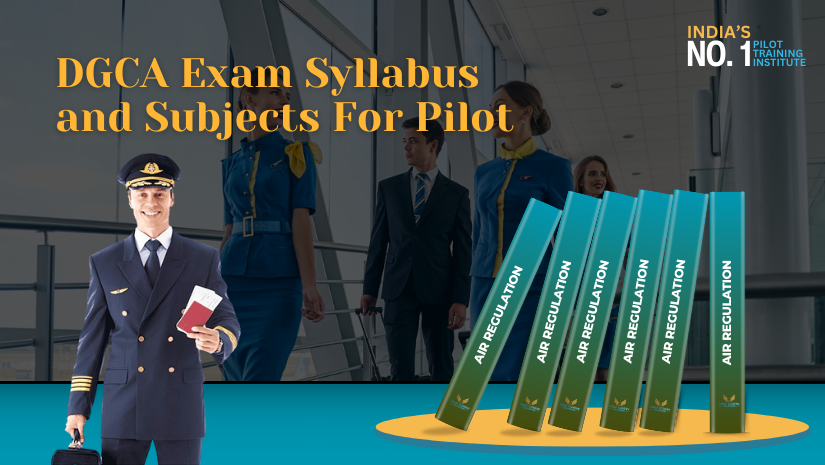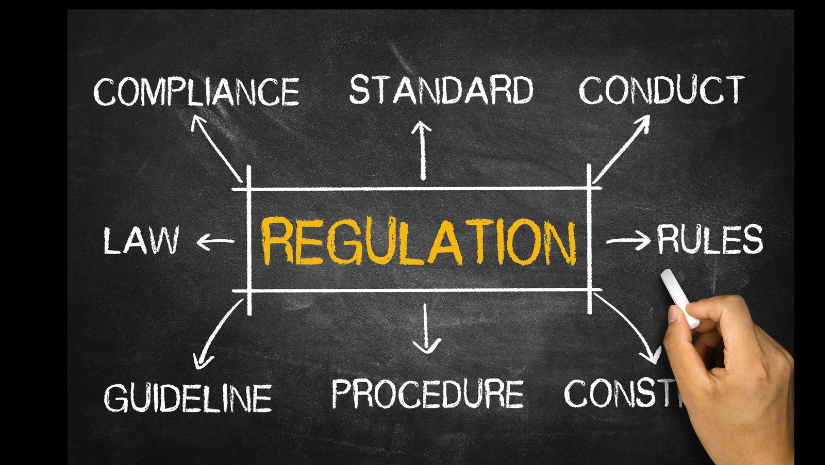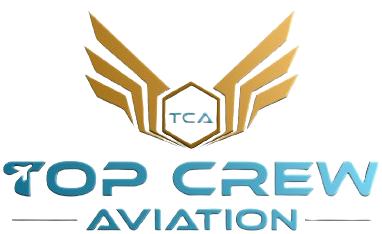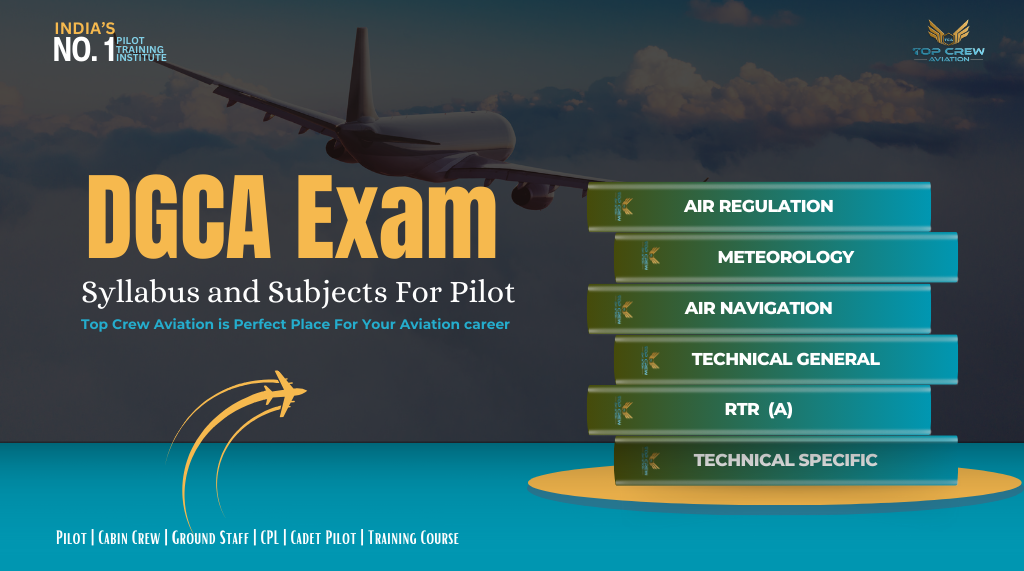Hi, Friends, We shall examine the entire breakdown of the Indian DGCA Cpl Exam Syllabus and Subjects today. If you’ve always wanted to be a pilot. The six primary subjects that you must master to receive a Commercial Pilot License (CPL) from the Directorate General of Civil Aviation (DGCA) will be covered in this article. We’ll go over every topic, from aviation meteorology to air navigation, to give you a solid understanding of what you will be learning.
All the information you need to lay the groundwork for your aviation career will be covered. All these subjects will be brand new to most of you but with Passion and Dedication, you will be able to crack them. We will look into DGCA CPL Ground Classes, their importance in the journey to become a Pilot in India, and also what books you need to study to clear DGCA Exams.
Top Crew Aviation has 16 years of experience in the Aviation Field and we have helped 7500+ Students achieve their dreams, If you have any doubts throughout don’t hesitate to Contact Us!
Table of Contents :
- What are DGCA CPL Ground Subjects
- Aviation Meteorology
- Air Regulation
- Air Navigation
- Technical General
- Technical Specific
- Radio Telephony Restricted RTR(A)
- Books you Need to Buy for DGCA CPL Subjects
- Why DGCA CPL Ground Classes are Important
- DGCA CPL Ground Class Fees
- Frequently Asked Questions(FAQs)
What are DGCA CPL Subjects:
To become a Pilot in India, here are the six main Subjects you need to study explained very briefly-

- Aviation Meteorology: Ever wondered why one day it’s sunny and another rainy the next? Well, this subject teaches you all about weather and how it affects flying.
- Air Regulation: Just like there are rules on the road when you’re driving, there are rules in the sky when flying a plane. This subject is learning about those air regulations” that deal with air transport operations and all Airline-related commercial and legal issues.
- Air Navigation: This is like learning, how to read a map but for flying Planes. You figure, out how to go from one place to another safely in the sky using Navigational Instruments and Techniques and learn about Instruments and their uses.
- Technical General: This is about understanding how Airplanes work. You learn about their parts, like the engine and wings, and how they work together to make an Airplane work!
- Technical Specific: This one’s a bit like Technical General, but instead of learning about all Airplanes, you focus on just one type. You learn all the details about that specific Plane.
- RTR(A) Exam: It ultimately comes down to radio usage in aircraft. You’re taught how to communicate with other pilots and the air traffic controllers so that everyone knows where they’re going and stays safe.
DGCA Exam and Pilot Subjects
Aviation Meteorology:
The First DGCA CPL Subject we recommend you tackle is Aviation Meteorology as it is easy to Understand and Rewarding to Learn as you will be using this knowledge in your Flying Training. Flying a Plane involves being constantly exposed to the vast sky and the forces of nature. As Pilots, we must have a thorough understanding of the atmosphere around us, including different types of clouds and their potential risks for flying.
Meteorology teaches us about the changes in weather throughout the seasons, such as temperature fluctuations and air pressure variations, geographical variations. We also study phenomena like fog, visibility, and wind patterns to enhance our safety in the skies. Exploring the hazards of flying, such as thunderstorms, icing, and lightning, can be a daunting experience to fly in. In India, we additionally focus on understanding our unique weather patterns in India Climatology, identifying them, and learning how to mitigate potential dangers.
We conclude by learning how to interpret METAR which is a special format for reporting weather that is used in Aviation to ensure there is a uniform way to break down and understand weather conditions in a specific location.
Air Regulation:
Being a Pilot goes beyond just flying planes, understanding Aviation rules is crucial. Air Regulations is a key aspect of the DGCA CPL Exam, covering topics like Airspaces, Rules of Air, Air Traffic Services, Pilot Health, and certification processes for Aviation Personnel in India. You also study safety regulations and legal requirements for Pilots and Operators. Understanding all of these rules is vital for ensuring safe flights.

When Pilots have a strong grasp of these rules, they can confidently make sound decisions during flights, navigate through different Airspaces, and comply with all legal obligations. For aspiring Pilots, mastering Air Regulations is more than just passing a test—it’s about prioritizing safety and professionalism in the Air which will be your responsibility as an Airline Pilot.
Air Navigation for Pilot Training:
In DGCA CPL Ground Subjects, one of the big topics you’ll get to study is Air Navigation. This means figuring out how to go from one place to another in the sky. You will be learning the basics of the Earth, Solar System, Time, and Distance. A few Topics you will encounter are
Graticules: they help you find your way by marking lines on maps and charts.
Latitudes: They’re like horizontal lines on a map, helping you measure distance from the equator.
Longitudes: on the other hand, are vertical lines that help you measure distance from the Prime Meridian.
Reading Maps and Charts: is crucial for pilots. They also need to understand magnetic directions to stay on course.
Instruments: are vital for a Plane to fly safely. You’ll study how these instruments are made, how they work, and how to use them to navigate.
Radio equipment: like VOR and DME, is essential for communication and navigation. You’ll also learn about radio waves and how they travel through the air and on the ground.
These are just some of the things you’ll cover in CPL air navigation classes. It’s a lot, but now you have a good idea of what to expect!
Technical General of Pilot:
Commercial Pilot Training includes a large chunk of Technical knowledge. It’s not just about flying; it’s also about understanding the ins and outs of aircraft.
That means understanding the structure of planes, their framework, and, importantly, their backup systems. Then, it’s all about how an Aircraft is controlled in the Sky. This involves getting to grips with hydraulic systems and which oils are used, which are crucial for manoeuvring through the skies.
But there’s more to learn beyond just steering. You’ll explore the mechanisms behind landing gear, how they fold up and down, and even how the Airplane Cabin stays cosy with air conditioning.
Safety is the Top Priority in Aviation, so you’ll get to know about fire safety equipment, how to tackle emergencies, and the intricacies of fuel systems. These elements form the backbone of an aircraft.
Yet, it’s not all nuts and bolts. You’ll also get a crash course in aerodynamics and the principles of flight. Understanding how wings generate lift is what propels us into the skies.
Technical Specific of DGCA Subjects:
In this DGCA CPL Subject, we learn the Technical Specifics of a single type of Aircraft, thus named Technical Specific. Unlike a broad study of various aircraft like in Technical General, we focus solely on the details relevant to the specific Planes you’ll be Flying and Training with.
The Subject deals with topics such as the dimensions of the Aircraft and the types of engines utilized. We explore whether it operates with propellers or gas turbines, as well as the specific fuel requirements for flight. Moreover, we understand essential information regarding the aircraft’s limitations, including weight restrictions, maximum speeds, and other fundamental specifications vital for safe operation.
This subject provides a concise yet comprehensive understanding tailored to the aircraft you’ll be handling, ensuring you’re well-equipped with the knowledge necessary for successful navigation and training.
Radio Telephony Restricted – RTR(A ) For Pilot :
The RTR (A) Exam, short for Radio Telephony Restricted exam, is conducted by WPC (Wireless Planning and Coordination), a department under the Department of Telecommunications. This exam is widely known for its difficulty, mainly due to its unique examination format.
The examination primarily assesses your practical communication skills over the radio and proficiency in the radiotelephony language. It comprises two distinct parts.
Firstly, there’s the transmission segment. You’re seated wearing headphones, with the examiner seated behind you. Armed with a question paper, you must respond verbally using appropriate phrases tailored to the given scenarios. Simultaneously, you need to jot down your responses on the answer sheet. This multitasking requirement, coupled with the pressure of real-time communication, contributes to the exam’s challenging nature.
Moving on to the second part, it’s an oral examination, often referred to as a viva. Here, you face questioning from an Interview panel. One represents WPC and focuses on Radio Navigation Theory. Meanwhile, the other examiner, typically from the DGCA, quizzes you on flight specifics, geographical knowledge, and Airspace understanding.
In this exam, mastery of the Radio Telephony language is paramount. Understanding when and how to employ specific phrases and terminologies is crucial. For instance, knowing the appropriate use of distress calls like “Mayday, Mayday, Mayday” and urgency calls like “ Pan-Pan, Pan-Pan, Pan-Pan” is essential for pilots facing emergencies.
Read More:- How to Get a Commercial Pilot License (CPL)?
DGCA Exam Syllabus and Subjects For Pilot Course:
Out of all the DGCA CPL exams Meteorology, Technical specifics are considered the easiest followed by Air Regulation. Navigation, Technical General, and RTR are of hard difficulty due to their vastness and overall larger curve of understanding. While these exams can be cleared through self-study we have found that the time required to do so can take a year or more. If you are adamant about self-studying these are the books we recommend –
- Aviation Meteorology – IC JOSHI + TCA Metrology Notes & Practice Papers
- Air Regulation – RK Bali + TCA Regulation Notes & Practice Papers
- Air Navigation – Oxford + TCA Air Navigation Notes & Practice Papers
- Technical General – Oxford + TCA Technical General Notes & Practice Papers
- Technical Specific – C152/C172/DA40 POH + TCA Tech. Specific Notes & Practice Papers
- RTR(A) – RK Bali + TCA RTR Notes & Practice Papers
You can purchase the best DGCA CPL Study Material by clicking here!
Why DGCA CPL Ground Classes are Important :
Most people are new to the Aviation Industry and thus do not have enough experience to efficiently Study the DGCA CPL Ground Subjects on their own, even if you do manage to you will more than likely have gaps in your knowledge since almost all subjects in DGCA CPL Ground Subjects are based on Practical Experience. It is definitely possible to Self-study if you have lots of time, but in the current boom in the Indian Aviation Industry and increased Hiring Rates, Time is of the Essence.
If you think you need guidance to clear exams we recommend joining a Ground School can be the best option as you get concepts taught by instructors who have flying experience which should make the learning process quicker and more efficient. With assistance from a Ground School clearing your exams can take 6-8 months as long as you are consistent with your studying.
If you are looking for one of the Best DGCA CPL Ground Schools that provides world-class CPL Ground Classes and Future Job Guidance then click here!, you can also Contact Us and Let us help you on your Aviation Journey!
DGCA Exam Course Fees:
Fees for DGCA CPL Ground Schools and Classes vary a lot, there are several factors such as Quality of Training, and number of Instructors, Online or Offline, which you will need to consider. In 2024 most DGCA CPL Ground School Fees at least Rs. 2L + for all subjects.
Read More:- Indigo Cadet Pilot Programs- Pilot Training, Duration, Requirements Fees
Frequently Asked Questions(FAQs) :
Question: What are the subjects covered in DGCA CPL Ground Classes?
Answer: The six main subjects are Aviation Meteorology, Air Regulation, Air Navigation, Technical General, Technical Specific, and RTR(A) Exam.
Question: Why is Aviation Meteorology important for aspiring pilots?
Answer: Aviation Meteorology is essential because it teaches about weather phenomena, such as clouds, temperature, and wind patterns, which affect flying safety and decision-making.
Question: What does the Air Regulation subject cover?
Answer: Air Regulation covers aviation rules, airspace regulations, air traffic services, pilot health, and certification processes, ensuring pilots understand legal requirements and safety protocols.
Question: What is the focus of Air Navigation studies in DGCA CPL Ground Classes?
Answer: Air Navigation focuses on understanding Earth’s geography, time, distance, map reading, navigational instruments, and radio equipment essential for safe aerial navigation.
Question: What does the Technical General subject cover?
Answer: Technical General educates pilots on aircraft structure, systems, controls, aerodynamics, safety equipment, and emergency procedures, providing a comprehensive understanding of aircraft operations.
Question: What distinguishes Technical Specific from Technical General?
Answer: Technical Specific delves into the detailed specifications of a specific aircraft type, including dimensions, engines, fuel requirements, limitations, and operational procedures tailored to that aircraft.
Question: What does the RTR(A) Exam assess?
Answer: The RTR(A) Exam evaluates practical communication skills over the radio, proficiency in the radiotelephony language, and knowledge of radio navigation theory and flight specifics through oral and transmission segments.
Question: What are some recommended books for self-study of DGCA CPL Ground Subjects?
Answer: Recommended books include IC JOSHI and TCA Meteorology Notes for Aviation Meteorology, RK Bali and TCA Regulation Notes for Air Regulation, Oxford and TCA Air Navigation Notes for Air Navigation, Oxford and TCA Technical General Notes for Technical General, C152/C172/DA40 POH and TCA Tech. Specific Notes for Technical Specific, and RK Bali and TCA RTR Notes for RTR(A).
Question: Why are DGCA CPL Ground Classes considered important?
Answer: DGCA CPL Ground Classes provide structured guidance from experienced instructors, filling knowledge gaps and expediting learning, crucial for aspiring pilots to navigate the competitive aviation industry efficiently.
Question: What is the typical duration for clearing DGCA CPL exams with assistance from a ground school?
Answer: With assistance from a ground school, clearing DGCA CPL exams typically takes 6-8 months, provided the student maintains consistent studying habits.
Question: What factors influence the fees for DGCA CPL Ground Schools and Classes?
Answer: Fees for DGCA CPL Ground Schools and Classes vary based on factors such as training quality, number of instructors, mode of instruction (online or offline), and additional services offered.
Question: How much do most DGCA CPL Ground Schools charge for all subjects in 2024?
Answer: In 2024, most DGCA CPL Ground Schools charge at least Rs. 2 lakhs or more for all subjects combined.
Question: What distinguishes the RTR(A) Exam from other DGCA CPL Ground Subjects?
Answer: The RTR(A) Exam stands out due to its unique examination format, focusing on practical communication skills over the radio, including oral and transmission segments, and proficiency in the radiotelephony language.
Question: Why is it recommended to start with Aviation Meteorology in DGCA CPL Ground Classes?
Answer: Starting with Aviation Meteorology is recommended because it provides foundational knowledge about weather phenomena, crucial for understanding flying conditions and ensuring safety during flight training and operations.

